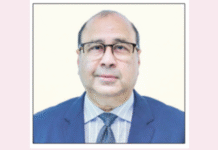The key drivers of Bangladesh’s economy, remittances, have fallen significantly during the current fiscal year thanks to ‘illegal transfer of money’ through mobile banking. In the last 10 months of this fiscal year, 16 per cent of the remittances have decreased.
‘Illegal’ money transfer, dubbed as digital hundi’ by the bankers, has become popular among millions of Bangladeshi expatriates.
The country’s banks, which were previously asked by the central bank to serve the people of the country, have already been affected by the lower flow of remittance.
Two teams of Bangladesh Bank (BB) representatives, led by the BB’s economic adviser Md Akhtaruzzaman and its general manager Habibur Rahman, have recently visited Singapore, Malaysia, and Saudi Arabia to determine the causes behind the reduction in remittance inflow.
According to a report submitted by the teams, mobile banking in the three countries is very popular among Bangladeshis, who prefer to send remittances through mobile banking services — ‘bKash’ and Dutch Bangla Bank’s mobile banking ‘Rocket’ — than normal banking services.
Through mobile banking, they can send money to their relatives in just five to ten minutes, the BB representative teams pointed out in their report.
Bangladesh Bank’s executive director and spokesperson, Shuvangkar Saha said, “The teams have drawn up recommendations in this regard. In the countries, money is being sent here through ‘bKash and Rocket’ mobile banking services. The authorities concerned have been asked to step up monitoring the agents involved in the mobile banking.”
Exchange houses stumble
Privately-owned National Bank Limited opened an exchange house in Malaysia to help expatriates send money to Bangladesh through banking services.
The bank officials said the bank authorities were provided with 1 million of Malaysian Ringgits to set up the exchange house.
In the subsequent years, it brought in profit for the bank and the bank authorities then opened nine more branches in the country. The bank drew 1.6 million Ringgits as profit from the outlets. The exchange house earned profits till July 2016. Now, however, it is a lost project, the bank officials said.
Malaysia’s NBL chief executive officer Sheikh Akhtar Uddin Ahmed told Prothom Alo over phone that ‘Business was good, but bKash and Rocket’ destroyed everything since last year.’
“Now no one comes to us and business is ruined.”
He also said, “If one sends money through bKash and Rocket services, they get high exchange rates. Just a mobile number is needed to this end.”
NBL money transfer division’s chief executive Zakaria Habib said, “If one sends money through bKash, they get Tk 1 or 2 extra in the exchange rate. That is why people are more inclined towards the services and we are suffering.”
Now, it is not only a matter of National Bank, but many other banks stationed in Singapore, Malayasia and Saudi Arabia which face the same consequences.
Most of the 36 banks in more than 13 countries are in the same condition. As many as 10 exchange houses of the banks have already shut down due to consistent losses.
In 2013, privately owned City Bank Limited (CBL) opened an exchange house in Malaysia. Later, the bank extended the number of branches to 6 that bagged handsome profit in 2015 and 2016.
CBL money transfer division’s chief executive Saidur Rahman said, “The customers now don’t come to our branches, they now send money through bKash from the comfort of their homes.”
Source: Prothom Alo









